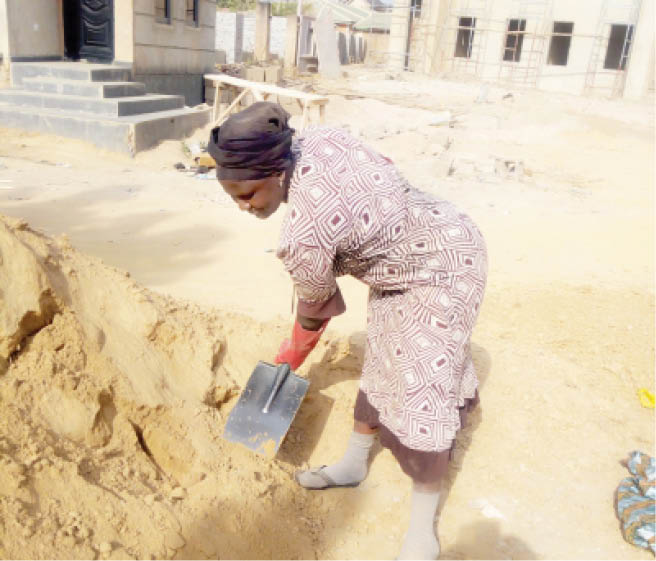How women are taking over ‘male jobs’ in Plateau
Plateau is one of the states believed to have a high rate, if not the highest, of women increasingly dominating jobs that were hitherto considered suited for men. Over the years, the number of women at building construction sites, stone breaking sites, on the farms, at mechanic workshops, among others, has been steadily increasing. Women […]

Agnes Lot working at a construction site in Jos
Plateau is one of the states believed to have a high rate, if not the highest, of women increasingly dominating jobs that were hitherto considered suited for men.
Over the years, the number of women at building construction sites, stone breaking sites, on the farms, at mechanic workshops, among others, has been steadily increasing.
Women are the dominant figures at the quarries; breaking stones blasted from the numerous rocks which abound in Jos. These women work under the sun from morning to evening.
In the farms too, more women are seen working than the men. They engage in all the farming processes from clearing and ploughing; planting to harvesting.
Some of the women who spoke to Daily Trust at a building construction site in Zaramaganda area of Jos said there is no longer any job or trade that is strictly for men, and one of them even reiterated the popular saying: “What a man can do, a woman can do even better.”
Thirty nine-year-old Mrs. Agnes Lot, a widow with four children, said she work at building construction sites to meet her needs and that of her children.
Mrs. Lot said, “We are really trying our best and work is going on well. We are enjoying what we are doing. There is no job that is the exclusive reserve for men any longer. Getting a job is difficult, so you do any that comes your way so that you can meet your needs.”
She further said, “Here, we start around 08:00am, go for a break by 01:00pm, come back at 02:00pm to continue. We then close by 05:00pm. I come every day, except Sundays, and we are paid N1,500 daily.”
Mrs. Lot added that, “I have four children. That is why I am doing this work to cater for them. I started work on this site last year, but I have been working at building sites now for about seven years.”
She, therefore, called on young ladies and the women folk generally to get up and do something for themselves and their families regardless of whether the work was considered male work, and added that, “God will help them and bless the work they are doing.”
On her part, 27-year-old Abigail Sunday from Tudun Wada area of Jos said she and her colleagues did the work at building sites better than some of the men.
Ms. Sunday said she had been doing the work for a while but stopped at some point and went back to school (Plateau State Polytechnic) where she studied Office Technology and Management, and that upon completion of her school she came back to the work since there was no other work at the moment.
Abigail who said she was not yet married and lived with her parents, explained that the work kept her going and made her independent of any man in terms of basic needs.
She said apart from the money they earns daily at the site, she has also learnt a skill in building and has used it to assist whenever a relative or family friend was building a house.
She said someday all what she had been learning at building construction sites would become useful in her life; particularly now that she has a certificate to go with.
Abigail, therefore, called on young girls not to be proud and carried away but should involve themselves in some of the jobs they are ignoring and overlooking or considering as jobs for only men.
